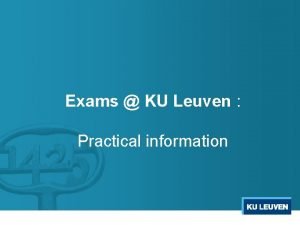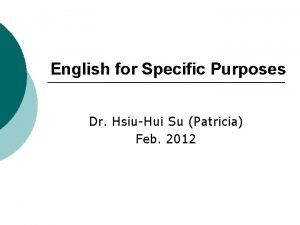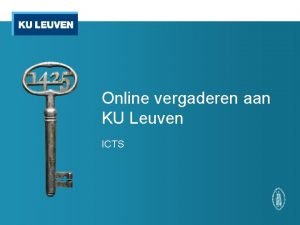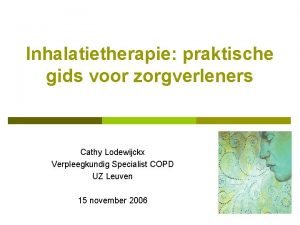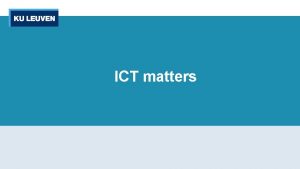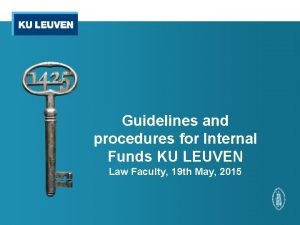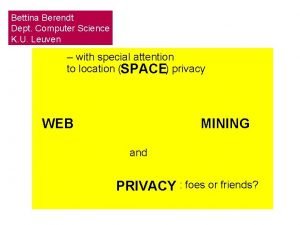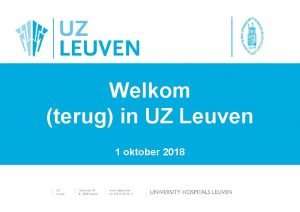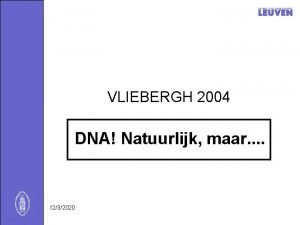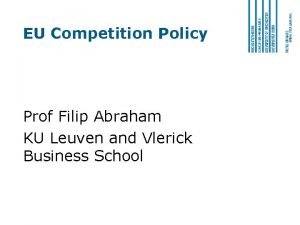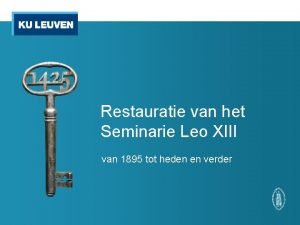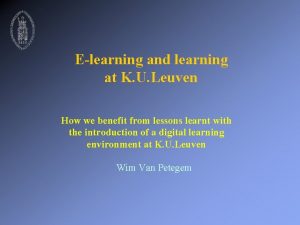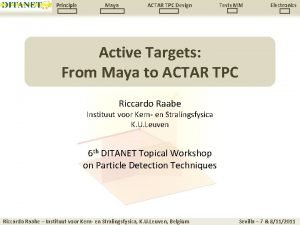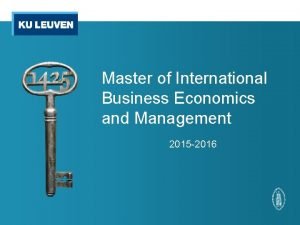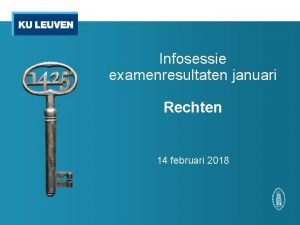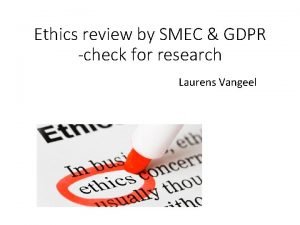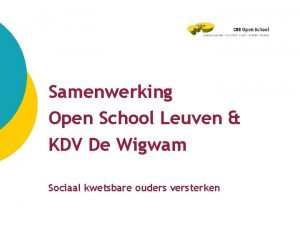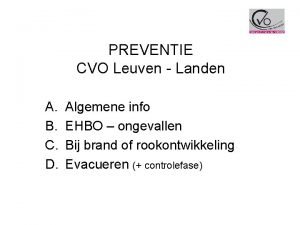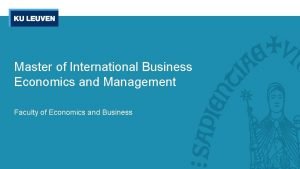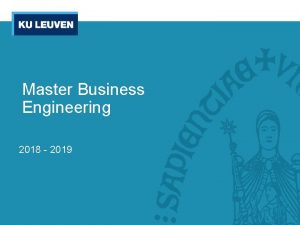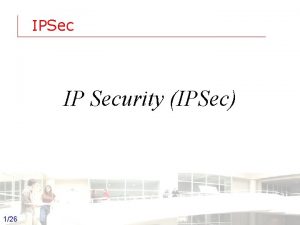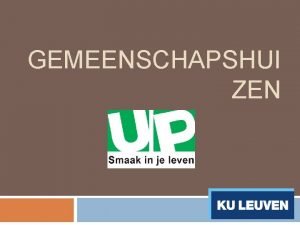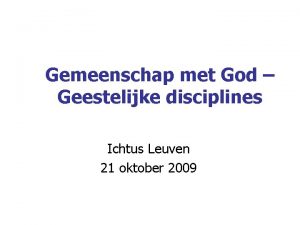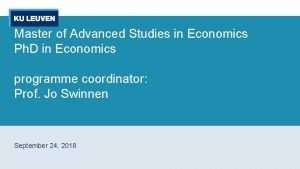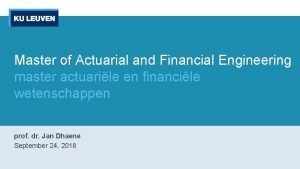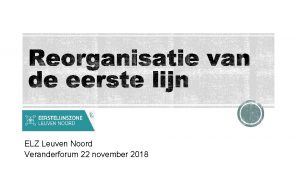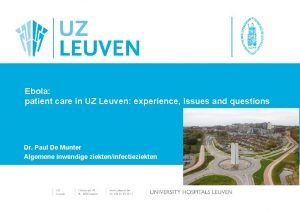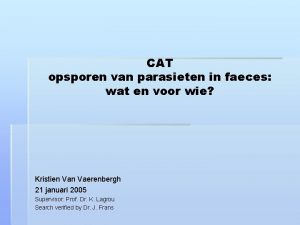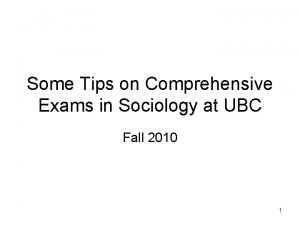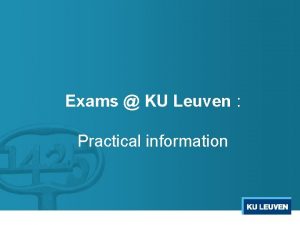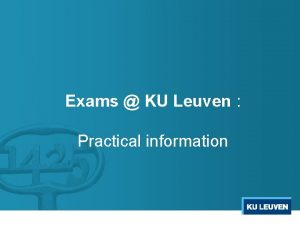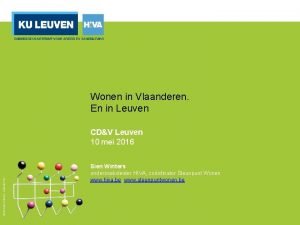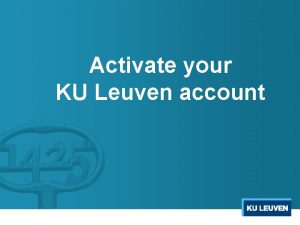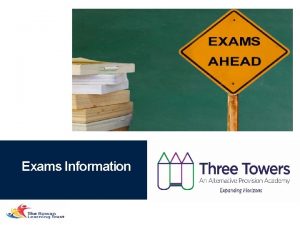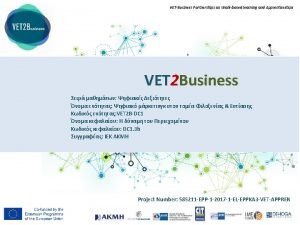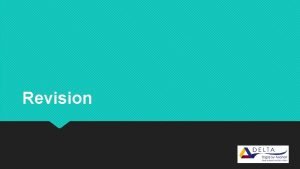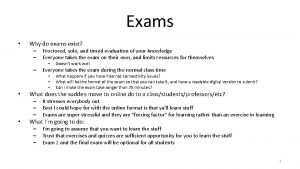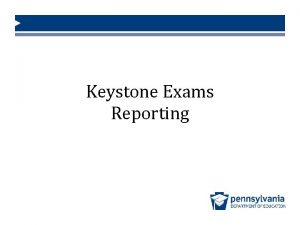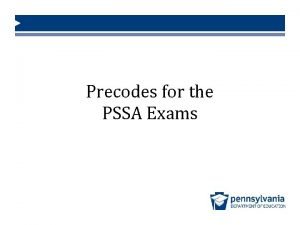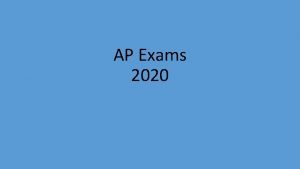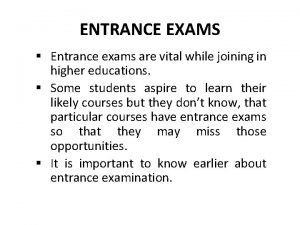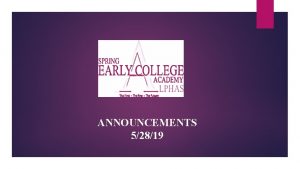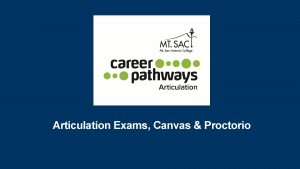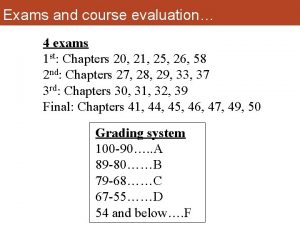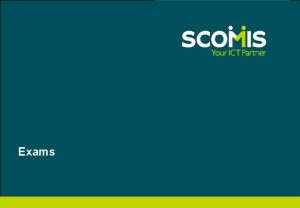Exams KU Leuven Practical information Content of this










































- Slides: 42

Exams @ KU Leuven : Practical information

Content of this session • Individual exam schedule • Different examination formats Oral exam o Written o Papers Cultural differences, grading Do’s and don’ts (at the day of your evaluation) Consultation of results & feedback Ombuds o • •

IES

Individual exam schedule (IES) • Where can I find it?

Individual exam schedule • Exam date, hour, room o o Students with exam facilities are located in different rooms Check before the start of the exam period • And during the exams (e. g. switching rooms) • Questions? o Contact your ombuds

Different examination formats

Different examination formats • Oral • Written Essay questions o Multiple choice • Paper • Computer exams: ask info at the end of this session o • Read the ECTS file of your course carefully • Check the information of the course o o Toledo instructions Sample questions, tips and tricks

Oral exam : progress • Location: classroom • Materials • • Student card Pen Open book or closed book No food/drinks unless otherwise told • Questions o 2 -3 questions on cards

Oral exam : progress • Check the guidelines of your professor • Preparation time : Mostly about 30 minutes (can be shorter) • Presenting (mostly +/- 15 minutes) o Oral presentation based on written preparation o Goal of additional questions? o Prof stops you? o • Is this a good sign? o o Dress code No feedback!

Written exam : multiple choice • Multiple choice = one choice (single choice exam) Multiple alternatives • Correction for guessing if indicated on the ECTS file o Ask for information from your professor o

Papers • Independent working • Sources and referring o Required in scientific writing (better too much than not enough) o KU Leuven has tool to detect plagiarism o Within text quotations, reference list o Avoid plagiarism : www. kuleuven. be/plagiarism

Cultural differences

Cultural differences? • Exams are difficult! • No selection at the beginning of programme but selection during the programme (= exams) • Grades are problably lower than in your home country • No information about results after oral exam

Grading

Grading Mark Transcript US ECTS % of succesfull Your answer 20 Outstanding A+ A 10% Exceptional, additional analyses, additional information Very good A B 25% 19 18 17 16 15 Good A- 14 13 Above average Satisfactory 10 30% D 25% B 12 11 C B-C+ C E 10% Own examples, counter examples, comparisons, critics, applications Structuring answer Memorizing literally, basic understanding 8 -9 Insufficient D Superficial knowledgecomprehension 0 -7 Very insufficient F Lack of knowledgecomprehension

Marks • Average : 12/20 • • 0 – 9 : 25% 10 – 14 : 50% 15 or more : 25% 20/20 : only 0. 2%

What are the levels of achievement? What are the levels of achievement a student can receive when he or she obtains the degree of Bachelor or Master? • • Distinction (cum laude) = 68% Great distinction (magna cum laude) = 77% Greatest distinction (summa cum laude) = 85% Greatest distinction (summa cum laude) with the congratulations of the examination committee = 90%

Do’s an don’ts The day of your evaluation

Do’s and don’ts • Always bring: student card, pens/pencils… (in transparent plastic bag) • Additional items for exam: calculator, study material, … Calculator with memory capacity is never allowed • No TI 84! Professor will let you know, when in doubt ask professor before taking out the items o Check first page of your exam ? Dictionary o KU Leuven degree student in MBA • Not allowed o Incoming exchange student: dictionary allowed from mother tongue to English • Not for language courses o • •

Do’s and don’ts • • Arrive on time= 30 minutes upfront Bathroom breaks are ‘facilitated’: don’t go alone Drinks are allowed, food normally not More than one group in the room – colour coded exams Scrap paper will be given to you (if needed). You need to hand these in as well, can’t take them home… You need to take off your jacket and hang it on the side of the classroom. No hats, … • Do not disassemble your exam • No cell phones or smartwatch: posession of phone is fraud!!! Leave these in your backpack.

Do’s and don’ts • If you like to receive a ‘zero score’ o Do not take a seat and notify the supervisor • If you take a seat and start the exam o Stay in exam room for at least 30 minutes • So that people are able to arrive late • Finalizing the exam o o Complete and sign both parts of the proof of participation • One part for you, one part for the supervisor • This is the only verification of participation Sign the attendance list

Not on time? • I am late o Contact the ombuds by phone or mail od. feb. antwerpen@kuleuven. be +32 3 201 18 10 or +32 476 56 76 81 • Do this (if possible) before the start of the exam! • When you arrive, go to the room of the ombuds (2. 12 or 2. 20) • You to your exam room if she is not there • If possible, you can start your exam • You can never start when other students handed in • No additional time

Not able to make it? • Contact the ombuds before the exam!!! o o Students with a visa: make sure you participate Unforeseen conditions (e. g. illness) • Official attestation needed (eg. certificate from physician) • As soon as possible, send copy by mail to od. feb. antwerpen@kuleuven. be + hand in the day of your next exam • Catch-up exam? o o o Decided independently by ombuds Only if the student has followed the procedures NEVER CONTACT YOUR PROFESSOR

Consultation of results & feedback





Exchange students Results and study progress

In case of failure In case of F or FX or a grade less than “ 10” • No obligation to retake the exam, ask your coordinator what to do • Retake period for everyone = August/September • No distance exam • If you would like to retake exam, deadline is first Thursday after exam results were published (July!), through KU Loket.

Registration for exams • Automatic for January and June exams • Necessary for August-September exams

Degree students Results and study progress

Exams: Pass/fail? • Passing a course ? o o 10/20 or more (= credit ) Only the courses < 10/20 2 nd exam chance • Exception: Degree students can tolerate one 9/20 if: • % within your program ≥ 68% (= distinction) • Only for one course • Not for Master’s thesis • Two evaluation moments for each course (incl. thesis) o o o Eg fail course in January • 2 nd chance in August/September Eg fail course in June • 2 nd chance in August/September Register in KU Loket for August/September exams!!!

Courses < 10/20 2 nd exam chance • Retake a course if you obtained less than 10 out of 20 o No retake for higher levels of achievement • Best result : you keep the best mark! (only within the same academic year) o Eg. Advanced Micro-Economics • January: 9/20 • August/September: 6/20 • => You keep the 9/20! (= BR ‘Best result’)

% CSE

Your study progress file •

Feedback

Feedback exams • After every exam period (Jan, June and Aug/Sep) • Goal o o Have a look into your exam Compare expected answer with your answer Discuss study method Expectations lecturer

Ombuds

Problems? • During the year: report absence to Ombuds Service • During exams: Contact the ombuds service!!! No agreements with teachers! o When… • you have a legitimate complaint about an exam • Mediation role of the ombuds • something went wrong, stress, … • Always welcome! • you cannot participate • see above

Contact • International office o Rebecca Rampelberg: rebecca. rampelberg@kuleuven. be • Ombuds o o o Room 2. 12 od. feb. antwerpen@kuleuven. be + 32 3 201 18 10 • Student administration office o Downstairs: feb. antwerpen@kuleuven. be

Good Luck!
 Ku leuven exam results
Ku leuven exam results Characteristics of esp
Characteristics of esp Dynamic content vs static content
Dynamic content vs static content Dekimo experts leuven
Dekimo experts leuven Icts leuven
Icts leuven Uz leuven antibiotica gids
Uz leuven antibiotica gids Isp kuleuven
Isp kuleuven Xior leuven
Xior leuven Gedocumenteerd kuleuven
Gedocumenteerd kuleuven Lets leuven database
Lets leuven database Soft token uz leuven
Soft token uz leuven Zoologisch instituut leuven
Zoologisch instituut leuven Filip abraham ku leuven
Filip abraham ku leuven Jan lenaerts
Jan lenaerts Leo xiii leuven
Leo xiii leuven Open science ku leuven
Open science ku leuven Leuven scale of engagement
Leuven scale of engagement Kotnet leuven
Kotnet leuven Tko leuven
Tko leuven Uc leuven vzw
Uc leuven vzw Cumulative study efficiency ku leuven
Cumulative study efficiency ku leuven Ku leuven
Ku leuven Ku leuven international business economics and management
Ku leuven international business economics and management Ku leuven examenresultaten
Ku leuven examenresultaten Smec kuleuven
Smec kuleuven Open school leuven
Open school leuven Pret kuleuven
Pret kuleuven Cvo leuven
Cvo leuven Ku leuven international business economics and management
Ku leuven international business economics and management Ku leuven whos who
Ku leuven whos who Leuven
Leuven Don bosco peda leuven
Don bosco peda leuven Ichtus leuven
Ichtus leuven Mase ku leuven
Mase ku leuven Actuarial engineering
Actuarial engineering Neuromusculair referentiecentrum
Neuromusculair referentiecentrum Elz leuven noord
Elz leuven noord Dnr code uz leuven
Dnr code uz leuven Trofozoiet
Trofozoiet Poem structure and form
Poem structure and form Maarit haikonen
Maarit haikonen Adit exams
Adit exams Comprehensive exams
Comprehensive exams
